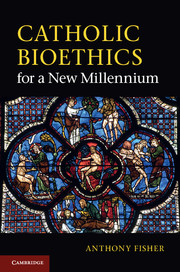Book contents
- Frontmatter
- Contents
- Foreword
- Abbreviations
- Introduction
- PART I How are we to do bioethics?
- Chapter 1 Context: challenges and resources of a new millennium
- Chapter 2 Conscience: the crisis of authority
- Chapter 3 Cooperation: should we ever collaborate with wrongdoing?
- PART II Beginning of life
- PART III Later life
- PART IV Protecting life
- Index
- References
Chapter 1 - Context: challenges and resources of a new millennium
from PART I - How are we to do bioethics?
Published online by Cambridge University Press: 05 June 2012
- Frontmatter
- Contents
- Foreword
- Abbreviations
- Introduction
- PART I How are we to do bioethics?
- Chapter 1 Context: challenges and resources of a new millennium
- Chapter 2 Conscience: the crisis of authority
- Chapter 3 Cooperation: should we ever collaborate with wrongdoing?
- PART II Beginning of life
- PART III Later life
- PART IV Protecting life
- Index
- References
Summary
Consumer bodies and recreational sex
Elizabeth Knox’s novel The Vintner’s Luck (Picador, 2000) was described in The Times as ‘an all-too-human chronicle of burning desire, violence, murderousness, bitter jealousy, curiosity, sexual deviation, shame and fidelity of a sort’. It is interesting what we regard today as ‘all-too-human’. The tale pivots on the annual meeting between Sobran, a nineteenth-century Burgundian vigneron, and Xas, a fallen angel. Along the way Knox elaborates the sexual adventures of the central characters: Sobran marries his childhood sweetheart Céleste only after impregnating her, but also continues his sexual affair with his brother-at-arms Baptiste, following him to the Napoleonic campaign in Russia. As the soldiers queue for prostitutes, Sobran penetrates one nine months pregnant, inducing her labour. After Baptiste’s death Sobran returns to his vineyard and has two affairs parallel to his marriage, one with Xas, an angel with the beautiful man’s body, and the other with Aurora, a local countess. Céleste gives him many children but has her own affair with his brother Léon, a sado-masochist who has his mistresses strangle him. The angel Xas roams the earth, looking for bodies rather than souls to devour, including not only Sobran but his son.
There is much more to this story and some of it admirable. But it is striking how seductively undisturbing it all is, despite all the violence and perversion. In the post-modern era people choose their own sexuality(s), more or less at whim. Nothing is natural or unnatural. Sex and sexuality, life-giving, even life-taking, are ‘privatized’, matters of taste – and tastes are changeable. Physiology, psychology, ethics, all are irrelevant to sex and life choices. What matters is the freedom to fulfil preferences. Liberal autonomy as freedom from nature – freedom from God and his order in the cosmos, or from the requirements of practical reason and the common good, indeed from any limit to the human will – has also become freedom from our own natures. In his excellent recent treatment of Life in the Flesh Adam Cooper observes that in modernity the body
has suffered a terrible fate. A fate not dissimilar, I would suggest, to that suffered by the literary text under Derrida, or by human nature under Nietzsche. The body has been destabilized and emptied of intrinsic meaning. It no longer speaks for itself. Whatever native voice it had has been silenced. Instead it now says what we want it to say.
- Type
- Chapter
- Information
- Catholic Bioethics for a New Millennium , pp. 13 - 37Publisher: Cambridge University PressPrint publication year: 2011



